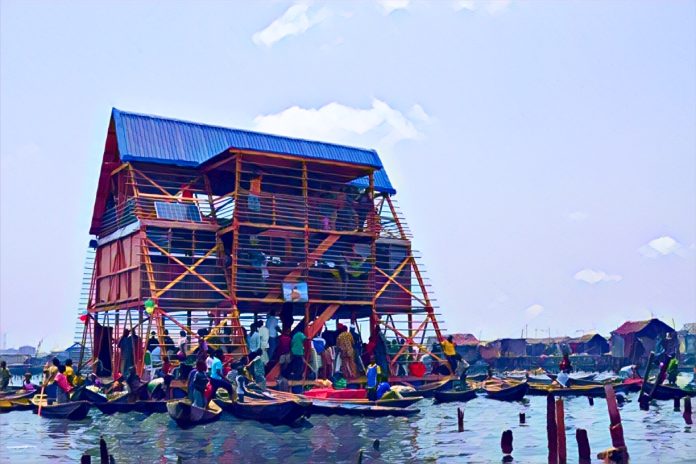KEY POINTS
-
Makoko’s floating classrooms are using solar panels, wind turbines, and pedal-powered generators to provide off-grid education to children in Lagos’ lagoon community.
-
The schools double as environmental hubs, where students and parents learn about renewable energy, sustainability, and digital literacy.
-
Despite limited resources, the initiative is transforming education access while modeling a green, community-driven approach to schooling in climate-vulnerable areas.
In the heart of Lagos, where wooden shacks rise on stilts above murky waters, a quiet educational revolution is taking shape. In Makoko — a water-based slum often referred to as the “Venice of Africa” — a group of floating classrooms powered entirely by renewable energy is changing the narrative for children growing up in one of Nigeria’s most underserved communities.
Built atop pontoons and anchored securely on Lagos Lagoon, these schools serve as lifelines for children who might otherwise be excluded from formal education due to flooding, poverty, or lack of infrastructure. But what sets these classrooms apart isn’t just their location — it’s how they’re powered.
Using a hybrid model of solar panels, wind turbines, and human-generated pedal energy, Makoko’s floating schools now run completely off-grid, lighting up classrooms, powering fans, charging tablets, and even operating low-energy water filtration units for safe drinking water.
“Our children are learning in the same space where clean power is generated — it’s part of the lesson,” says Ifeanyi Olatunde, a local educator who has taught in Makoko for over a decade. “We are teaching them maths, science, and reading — but also sustainability and innovation.”
Educators in makoko are embedding renewable energy into both the curriculum and the culture
The renewable-powered classrooms are the result of a grassroots partnership between local NGOs, international environmental groups, and Makoko’s own residents, many of whom contributed labor, materials, and even recycled components for construction.
One notable initiative, the Makoko Solar Learning Project, funded by an alliance of green tech firms and urban education advocates, helped bring modular solar panels to the floating platforms.
At the heart of this movement is the desire to decouple learning from the instability of Nigeria’s national grid. Power outages have long disrupted education across the country, but in Makoko — where no formal electricity infrastructure exists — the need for innovation is existential.
“Before the solar panels, we had to cut lessons short when the sun went down,” recalls Aisha Salami, a volunteer teacher at one of the schools. “Now we can run classes into the evening and even offer adult literacy programs at night.”
These floating classrooms are not only equipped with renewable energy sources but also with recycled furniture, eco-friendly building materials, and digital learning tools powered by solar batteries. Children as young as seven are being introduced to coding apps, digital storytelling, and renewable science kits — all under the gentle hum of solar inverters.
The physical structure of the schools also adapts to Makoko’s unique geography. Elevated walkways connect classrooms, while rainwater harvesting systems collect water used for sanitation and gardening projects. Students help maintain the equipment, learning the mechanics of solar panels, turbine wiring, and even bicycle-based generators they use to create energy during physical education classes.
The broader aim is to make the community self-sufficient — not just educationally, but environmentally. Some schools have begun offering weekend workshops for parents, teaching basic energy repair, solar maintenance, and environmental conservation. Local youth groups have emerged from these trainings, creating small-scale solar installations for homes and shops.
“It’s not just about schooling anymore,” says Tosin Ayobami, a community energy coordinator. “It’s about empowerment, sustainability, and breaking cycles of dependency.”
Despite the progress, challenges persist. Heavy rains occasionally disrupt operations, and the cost of maintaining and upgrading renewable systems remains high. Funding is piecemeal, and not every child in Makoko can access these facilities yet. However, stakeholders remain optimistic.
In a country where over 40% of schools still lack access to electricity, Makoko’s floating classrooms stand as both a symbol and a prototype — a community-led model for what education can look like when powered by innovation, resilience, and the sun.
“It’s education for the future, powered by the future,” says Olatunde. “And it’s happening right here on water.”



